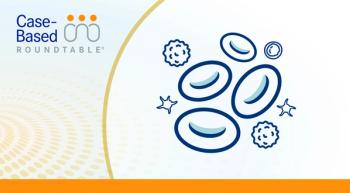
Part 1: BTK Inhibitors for CLL in the Second Line
During a live virtual event, Danielle Brander, MD, discussed with participating physicians second-line treatment options for patients with chronic lymphocytic leukemia, with questions guided by Targeted Oncology.
CASE SUMMARY
- A 53-year-old woman presented with an elevated white blood cell (WBC) count found incidentally.
- Medical history: hypertension managed with losartan
- Physical examination: left axillary lymph node, 1 cm × 1 cm
- Laboratory results:
- WBCs: 117.3 × 109/L
- Lymphocytes: 109.2 × 109/L
- Hemoglobin: 12.6 g/dL
- Platelets: 174 × 109/L
- Lactate dehydrogenase: 160 U/L
- Molecular testing:
- Flow cytometry: CD19+, CD5+, CD20+, CD23+, and k-restricted monoclonal B-cell population
- IGHV unmutated
- Fluorescence in situ hybridization (FISH): normal
- Bone marrow: chronic lymphocytic leukemia (CLL) in 86% of cells
- The patient was monitored for 5 years, at which point she developed symptoms:
- WBCs: 250 × 109/L
- Hemoglobin: 9.6 g/dL
- Platelets: 105 × 109/L
- Lymph node, now 4 × 3 cm
- The patient was treated with 6 cycles of fludarabine, cyclophosphamide, and rituximab (Rituxan) and achieved complete remission.
- Four years later (at aged 62 years), she had a relapse.
- WBCs: 80 × 109/L
- Hemoglobin: 9.5 g/dL
- Platelets: 60 × 109/L
- FISH: del(17p)
Targeted Oncology™: What are the guideline-recommended regimens to treat a patient with CLL such as this one?
BRANDER: The [National Comprehensive Cancer Network] guidelines for regimens in the relapsed/refractory setting include acalabrutinib [Calquence] and venetoclax [Venclexta], which are approved in all lines of therapy. In the relapsed/refractory setting, there’s also approval of duvelisib [Copiktra] and idelalisib [Zydelig], which are PI3K inhibitors.1
What data support the use of ibrutinib (Imbruvica), which is another guideline-recommended agent for the treatment of this patient?
The data that led to the initial approval of ibrutinib was the RESONATE trial [NCT01578707]. [The trial] randomized patients 1:1 to either ibrutinib or the anti-CD20 antibody standard-of-care agent in the relapsed/refractory setting, ofatumumab. Patients were allowed to cross over on this study.2
There are now 6-year follow-up data [showing that the] median progression-free survival [PFS] for the ibrutinib arm was not reached but was short [8.1 months] for the ofatumumab alone [HR, 0.133; 95% CI, 0.099-0.178]. Markers [of prognosis] that would indicate inferior response to chemoimmunotherapy are either the patients with IGHV unmutated or del(17p) or del(11q), who are still having good responses. This is in the relapsed/refractory setting with novel agents.
The grade 3 or greater AEs [adverse effects] that you’ll see are infectious complications. Infections and neutropenia do get better in terms of incidence with [time]. But obviously, if they have to stop [treatment] in the first year, it’s still detrimental to them. One thing [to keep in mind when] monitoring patients is that time on therapy does increase risks for hypertension. Atrial fibrillation and bleeding remain a risk throughout treatment. Often, they first appear early on treatment.
What other Bruton tyrosine kinase (BTK) inhibitors would you consider for treatment of this patient?
The phase 3 ASCEND study [NCT02970318] was recently updated, presented, and published. In the relapsed/refractory [setting], it looked at acalabrutinib vs either choice of BR [bendamustine and rituximab] or idelalisib/rituximab. This was mostly done internationally, especially with approvals and availability at the time. The primary end point was PFS.3
The difference in PFS of acalabrutinib was not reached vs 16 months with either idelalisib/rituximab or BR [HR, 0.41; 95% CI, 0.20-0.49; P < .0001]. PFS by subgroup is as we’ve seen with [ibrutinib, with benefit in most patients].
There are less hematological toxicities vs chemoimmunotherapy. You will see more of other AEs like diarrhea [with chemoimmunotherapy and PI3K inhibitors], and these can be seen [at lower rates] with BTK inhibitors.
References:
1. NCCN. Clinical Practice Guidelines in Oncology. Chronic lymphocytic leukemia/small lymphocytic lymphoma, version 1.2022. Accessed November 16, 2021.
2. Byrd JC, Hillmen P, O’Brien S, et al. Long-term follow-up of the RESONATE phase 3 trial of ibrutinib vs ofatumumab. Blood. 2019;133(19):2031‐2042.doi:10.1182/blood-2018-08-870238
3. Ghia P, Pluta A, Wach M, et al. ASCEND phase 3 study of acalabrutinib vs investigator’s choice of rituximab plus idelalisib (IDR) or bendamustine (BR) in patients with relapsed/refractory (R/R) chronic lymphocytic leukemia (CLL). Abstract presented at: 24th European Hematology Association Congress; June 13-15, 2020; Amsterdam, Netherlands. Accessed November 16, 2021.


















